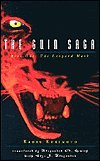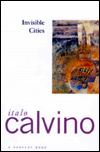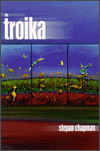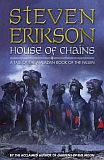
The Guin Saga, by Kaoru Kurimoto
Book Review by James Michael White
Have you read this book?
Young adult heroic fantasy may be overshadowed these days in a market polysaturated with gigantic multi-volume world-building word orgies bulging with all the jejune appeal of silicone teats (think Tad Williams, Robert Jordan, et alia), but there's something to be commended about a work that barges boldly ahead in slim and trim form, delivering both heroes and fantasy in efficient swaths of thematic primary color.
Book One of The Guin Saga, by Kaoru Kurimoto serves up its Frank Frazetta-like muscle-bound he-mensch hero on page one with descriptive terms like freakish, peculiar, and bizarre. That's because, in addition to his loincloth, he wears a permanently-affixed leopard mask, evoking fantastical shades of Alexander Dumas because this man, not in an iron but a leopard mask, is at once more and less than he seems. Turns out he has no memory of who he is or how he came in such physical disrepair to the haunted forest where Kurimoto's prologue places him, but thenceforward he acquits himself in heroic enough fashion many times to demonstrate all the vital qualities of heroes and kings.
And how do these heroic deeds come to pass? Also inexplicably in this forest are the twins Rinda and Remus, fugitive orphans of the recently-sacked kingdom Parros, "the richest and most beautiful realm in the Middle Country." Finding the ailing Guin, the twins, sporting fantasy-issue platinum hair and violet eyes, nurse him back to health. Having plucked that figurative thorn from the leopard's paw, the kids find themselves in his good graces in the nick of time as first they are bedeviled by black knights searching for the fugitive twins, then the wicked spirits of the forest, then even more black knights.
In a similar fashion the plot continues to develop, this trio escaping one frying pan only to fall into more and more literal fires, a process that crosses their paths with the villainous Black Count Vanon, who serves the Archduke Vlad, who rules the Mongauls, who happen to be the ones who attacked Parros; they also cross paths with a gabby mercenary, Istavan, and the tiny monkey girl Suni, each crossed path clearly setting up a thread for exploration somewhere else in the series and, here, supplying plot points sufficient to foreshadow Book One's denouement.
The Guin Saga plows no new ground in heroic fantasy territory, at least not in Book One, but what it does manage to do is create interesting characters embroiled in compelling circumstances, cranking out plot with saga-like rapidity in which characters are not developed by internal explorations of psychology but by deeds (recall, for instance, Saga of the Volsungs, and ask yourself how much more about Sigurd you know other than, hey, he killed that dragon Fafnir). Thus Guin, largely a blank slate anyway, shows us who he is by his heroic action. Likewise Rinda, here sharing more-or-less equal footing on this literary stage with Guin, demonstrates all the monarchial qualities of wisdom, benevolence, and strength of will one might expect of budding royalty (rather like Rome's Romulus, by the way, which hardly seems coincidental), while Remus, playing a very minor part in Book One, takes a touch longer to show his princely potential.
But action and deeds alone don't drive the plot. The gas in this tank is mystery and expectation. We're presented numerous question, for instance those compelling ones driving Guin and the kids -- Who is Guin? Why is he stuck with that mask? Why was Parros destroyed? How and why did the twins find themselves in the haunted forest? -- and we expect answers. Sometimes those answers are supplied, and just as many times it seems those answers await us deeper in the series. The result is a work that is compelling not only because it places vulnerable and appealing characters in danger, but because the mixture of action and mystery keeps us looking for the root causes of the injustices perpetrated against the main characters. The work manages to convince that if we just keep reading our questions will be answered.
This means that though the immediate problems confronting the main characters in Book One are solved by its end, the larger ones remain. If you want all the answers, you'll have to keep reading the series. Fortunately, Book One of The Guin Saga is solid heroic fantasy. Kurimoto sets a hook here and pulls it hard. On one hand readers will be disappointed that the book ends, but on the other hand they can look forward to following what, by all appearances, seems to be a well-done series. After all, originally published in 1979, and with some 25 million books sold from 87 finished volumes of a planned one hundred, lots of readers have already decided that Kaoru Kurimoto is doing something right. Judging by this work, they aren't wrong.
Such considerations aside, there are a few other matters about The Guin Saga that are worth noting. The first is that, as English translations of Japanese literature go, this has to be one of the best translations I've yet read. The language is fluid and establishes a strong narrative voice.
The second is that the work is not without an obvious flaw or two, the minor ones looking like missed line edits (which seem to exist in increasing abundance in most books these days), the other involving the ambiguous age of the twins. At one point they seem clearly to be fourteen and, a handful of pages later, they seem to be fifteen, the offending lines being, "...for all of his fourteen years..." (page 22 in my edition), and, "For fifteen years they had lived as an inseparable pair..." (page 35). This looks easily enough fixed, but it's there nonetheless. More important, however, is that the twins initially seem much younger than fourteen, perhaps as young as eight, a perception deriving mainly from their clingy and, well, childish-seeming nature. Perhaps this is merely intended to reflect the nature of their peaceful upbringing, but it doesn't quite convince.
More interestingly, however, is that this Japanese-authored work sports so many western-seeming touches, not the least of which is much of its mythology. As mentioned, the twins themselves seem to have analogues in Romulus and Remus, which may tell us where the plot will go and why, but there are also touches of Greek and Roman gods who appear, at the very least, influenced by Janus from the Romans and the Fates from the Greeks. Perhaps this means that just as western audiences find non-western elements in their fiction exotic and enticing, so too, perhaps, do eastern audiences enjoy touches of what is foreign. Or, on another level, sometimes the most interesting observations about a culture and its dearest myths are best stated by those who, standing outside that culture, express themselves through its most popular forms. As such, The Guin Saga may well prove as big a hit here as it was in Japan.
Book One of The Guin Saga, by Kaoru Kurimoto serves up its Frank Frazetta-like muscle-bound he-mensch hero on page one with descriptive terms like freakish, peculiar, and bizarre. That's because, in addition to his loincloth, he wears a permanently-affixed leopard mask, evoking fantastical shades of Alexander Dumas because this man, not in an iron but a leopard mask, is at once more and less than he seems. Turns out he has no memory of who he is or how he came in such physical disrepair to the haunted forest where Kurimoto's prologue places him, but thenceforward he acquits himself in heroic enough fashion many times to demonstrate all the vital qualities of heroes and kings.
And how do these heroic deeds come to pass? Also inexplicably in this forest are the twins Rinda and Remus, fugitive orphans of the recently-sacked kingdom Parros, "the richest and most beautiful realm in the Middle Country." Finding the ailing Guin, the twins, sporting fantasy-issue platinum hair and violet eyes, nurse him back to health. Having plucked that figurative thorn from the leopard's paw, the kids find themselves in his good graces in the nick of time as first they are bedeviled by black knights searching for the fugitive twins, then the wicked spirits of the forest, then even more black knights.
In a similar fashion the plot continues to develop, this trio escaping one frying pan only to fall into more and more literal fires, a process that crosses their paths with the villainous Black Count Vanon, who serves the Archduke Vlad, who rules the Mongauls, who happen to be the ones who attacked Parros; they also cross paths with a gabby mercenary, Istavan, and the tiny monkey girl Suni, each crossed path clearly setting up a thread for exploration somewhere else in the series and, here, supplying plot points sufficient to foreshadow Book One's denouement.
The Guin Saga plows no new ground in heroic fantasy territory, at least not in Book One, but what it does manage to do is create interesting characters embroiled in compelling circumstances, cranking out plot with saga-like rapidity in which characters are not developed by internal explorations of psychology but by deeds (recall, for instance, Saga of the Volsungs, and ask yourself how much more about Sigurd you know other than, hey, he killed that dragon Fafnir). Thus Guin, largely a blank slate anyway, shows us who he is by his heroic action. Likewise Rinda, here sharing more-or-less equal footing on this literary stage with Guin, demonstrates all the monarchial qualities of wisdom, benevolence, and strength of will one might expect of budding royalty (rather like Rome's Romulus, by the way, which hardly seems coincidental), while Remus, playing a very minor part in Book One, takes a touch longer to show his princely potential.
But action and deeds alone don't drive the plot. The gas in this tank is mystery and expectation. We're presented numerous question, for instance those compelling ones driving Guin and the kids -- Who is Guin? Why is he stuck with that mask? Why was Parros destroyed? How and why did the twins find themselves in the haunted forest? -- and we expect answers. Sometimes those answers are supplied, and just as many times it seems those answers await us deeper in the series. The result is a work that is compelling not only because it places vulnerable and appealing characters in danger, but because the mixture of action and mystery keeps us looking for the root causes of the injustices perpetrated against the main characters. The work manages to convince that if we just keep reading our questions will be answered.
This means that though the immediate problems confronting the main characters in Book One are solved by its end, the larger ones remain. If you want all the answers, you'll have to keep reading the series. Fortunately, Book One of The Guin Saga is solid heroic fantasy. Kurimoto sets a hook here and pulls it hard. On one hand readers will be disappointed that the book ends, but on the other hand they can look forward to following what, by all appearances, seems to be a well-done series. After all, originally published in 1979, and with some 25 million books sold from 87 finished volumes of a planned one hundred, lots of readers have already decided that Kaoru Kurimoto is doing something right. Judging by this work, they aren't wrong.
Such considerations aside, there are a few other matters about The Guin Saga that are worth noting. The first is that, as English translations of Japanese literature go, this has to be one of the best translations I've yet read. The language is fluid and establishes a strong narrative voice.
The second is that the work is not without an obvious flaw or two, the minor ones looking like missed line edits (which seem to exist in increasing abundance in most books these days), the other involving the ambiguous age of the twins. At one point they seem clearly to be fourteen and, a handful of pages later, they seem to be fifteen, the offending lines being, "...for all of his fourteen years..." (page 22 in my edition), and, "For fifteen years they had lived as an inseparable pair..." (page 35). This looks easily enough fixed, but it's there nonetheless. More important, however, is that the twins initially seem much younger than fourteen, perhaps as young as eight, a perception deriving mainly from their clingy and, well, childish-seeming nature. Perhaps this is merely intended to reflect the nature of their peaceful upbringing, but it doesn't quite convince.
More interestingly, however, is that this Japanese-authored work sports so many western-seeming touches, not the least of which is much of its mythology. As mentioned, the twins themselves seem to have analogues in Romulus and Remus, which may tell us where the plot will go and why, but there are also touches of Greek and Roman gods who appear, at the very least, influenced by Janus from the Romans and the Fates from the Greeks. Perhaps this means that just as western audiences find non-western elements in their fiction exotic and enticing, so too, perhaps, do eastern audiences enjoy touches of what is foreign. Or, on another level, sometimes the most interesting observations about a culture and its dearest myths are best stated by those who, standing outside that culture, express themselves through its most popular forms. As such, The Guin Saga may well prove as big a hit here as it was in Japan.
| The Guin Saga, by Kaoru Kurimoto on Amazon |
The Guin Saga, by Kaoru Kurimoto on Amazon

Comment on The Guin Saga, by Kaoru Kurimoto
| Comments on The Guin Saga, by Kaoru Kurimoto |
| There are no comments on this book. |



